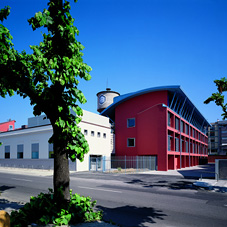| |

|
 |
Scuola Superiore Sant’Anna
- CRIM Lab
 The
Scuola Superiore Sant'Anna is a public institution for
university education. It offers opportunities for research
and advanced undergraduate and graduate training in
the fields of social sciences (economics and management,
law, political science) and experimental sciences (engineering,
medicine and agricultural science). The School's mission
is to educate students in a stimulating and active academic
environment offering: personalised undergraduate tutoring,
graduate programs (master's and doctoral programs),
and continuing education professional courses; multiple
and growing international networks of universities and
other public and private research institutions; exchange
programs with Italian and foreign professional and business
associations, firms and public agencies in several areas
of technological development, applied medical research,
business organisation and training; basic and applied
scientific research and cutting-edge technological development. The
Scuola Superiore Sant'Anna is a public institution for
university education. It offers opportunities for research
and advanced undergraduate and graduate training in
the fields of social sciences (economics and management,
law, political science) and experimental sciences (engineering,
medicine and agricultural science). The School's mission
is to educate students in a stimulating and active academic
environment offering: personalised undergraduate tutoring,
graduate programs (master's and doctoral programs),
and continuing education professional courses; multiple
and growing international networks of universities and
other public and private research institutions; exchange
programs with Italian and foreign professional and business
associations, firms and public agencies in several areas
of technological development, applied medical research,
business organisation and training; basic and applied
scientific research and cutting-edge technological development.
 The
research structure of the SSSA is composed of several
laboratories active in different research fields, including
technologies for minimally invasive therapy, biomechatronic
and artificial perception systems. The
research structure of the SSSA is composed of several
laboratories active in different research fields, including
technologies for minimally invasive therapy, biomechatronic
and artificial perception systems.
The CRIM Lab (Centre for Applied Research in Micro and
nano-engineering) was established at the SSSA with the
specific mission to perform applied research on micro-mechatronics
mainly in the biomedical field, and to implement service
activities aimed at promoting the industrial take-up
and exploitation. At present the CRIM has more than
30 full time researchers possessing interdisciplinary
expertise; a variable number of undergraduate students
are also involved.
 The
facilities of the CRIM Lab include precision machines
(Precision mechanics machine shop), Ultraprecision
Machining (high precision CNC machining, micro-wire
and micro-sink Electro Discharge Machining, Focused
Ion Beam), Clean Room (Equipment for lithography,
silicon micromachining, thin film deposition –
Sputtering and ion beam evaporator – and monomolecular
layer deposition, 3D Non-Traditional Technologies consisting
in micro-injection moulding, micro-stereolithography
and precision electrodeposition, Silicon Bulk Micromachining,
Profilometer and Ellipsometer, Measurement and testing
machines, Microscopes (AFM/STM Microscope, Optical fibre
microscope, Optical microscope), MEMS characterization
equipment (micromechanical test bench with precision
load cell), surface characterization equipment, electrical
characterization equipment, Optical Sensors research
equipment (HeNe Laser, Lasers for distance measurements,
UV visible power meter), Simulation and Design Software
(ANSYS, Pro-Engineer, Electronic Laboratory). These
microengineering equipments integrate nicely the expertise
in modeling, simulation and characterization at component
and system level. The
facilities of the CRIM Lab include precision machines
(Precision mechanics machine shop), Ultraprecision
Machining (high precision CNC machining, micro-wire
and micro-sink Electro Discharge Machining, Focused
Ion Beam), Clean Room (Equipment for lithography,
silicon micromachining, thin film deposition –
Sputtering and ion beam evaporator – and monomolecular
layer deposition, 3D Non-Traditional Technologies consisting
in micro-injection moulding, micro-stereolithography
and precision electrodeposition, Silicon Bulk Micromachining,
Profilometer and Ellipsometer, Measurement and testing
machines, Microscopes (AFM/STM Microscope, Optical fibre
microscope, Optical microscope), MEMS characterization
equipment (micromechanical test bench with precision
load cell), surface characterization equipment, electrical
characterization equipment, Optical Sensors research
equipment (HeNe Laser, Lasers for distance measurements,
UV visible power meter), Simulation and Design Software
(ANSYS, Pro-Engineer, Electronic Laboratory). These
microengineering equipments integrate nicely the expertise
in modeling, simulation and characterization at component
and system level.
CRIM developed 10 international patents, and has been
or is still involved in more than 10 national projects,
more than 20 projects funded by the European Commission,
2 European Competence Centers (Microfluidics and Medical
Micro Instruments), 3 European Networks of Excellence,
and several international projects and cooperations. |
|
|